Orange Cranberry Sourdough Bread
This post may contain affiliate links.
The smell of this orange cranberry sourdough bread baking will have you smiling, even before you taste it! There is something truly special about this flavor combination, it's a wonderful choice for the holiday season but can be enjoyed anytime!
One of the best things about this loaf is you can choose to add other things like walnuts or pistachios if you like. You can sweeten it with honey or maple syrup, or leave these out if you prefer.
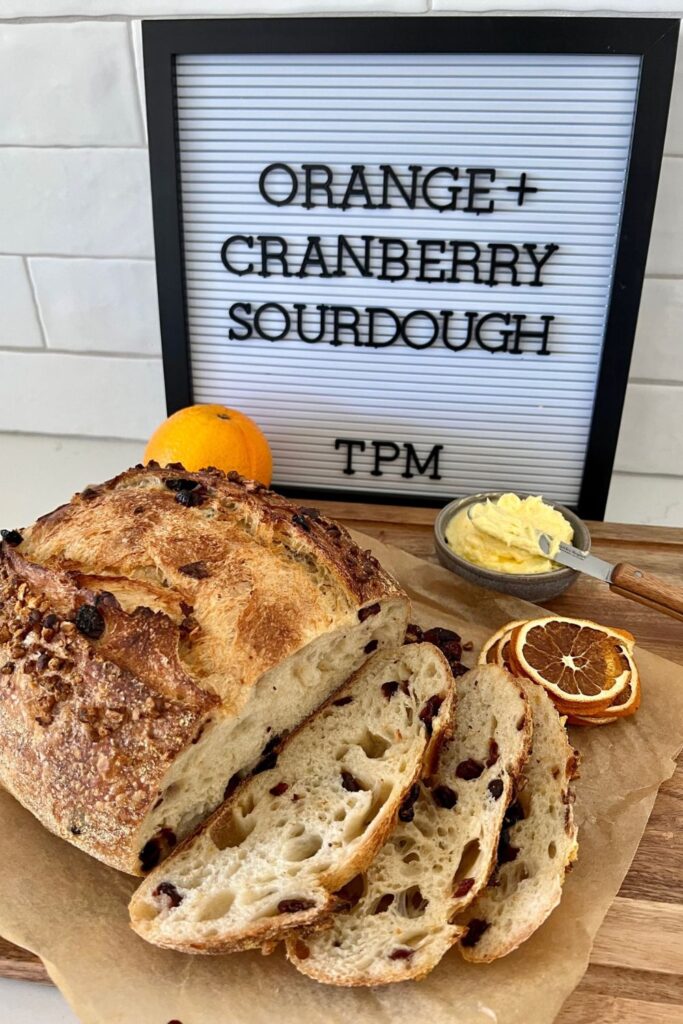
Why You'll Love This Recipe
Perfect Holiday Centrepiece - the traditional flavors of orange and cranberry make this sourdough loaf the perfect Thanksgiving centrepiece.
Beginner Friendly - this loaf is perfect for sourdough beginners, given that it uses dried cranberries, rather than fresh or frozen cranberries.
Makes a Lovely Gift - Combine this flavorful loaf with a jar of homemade butter, cultured butter or even this whipped honey cinnamon butter for a heartfelt holiday gift.
Ingredients
- Sourdough Starter - you want active sourdough starter that's fed and bubbly to create this fragrant loaf of sourdough bread. Leave your sourdough discard for creating these orange and cranberry sourdough muffins. If you haven’t made a starter yet, you’ll find everything you need in my post on making a sourdough starter. You can use this guide to adjust the amount of starter you use in the recipe.
- Water - room temperature water is best, try not to use cold water or else it will take much longer for your dough to ferment.
- Honey - a little honey brings sweetness to this loaf and pairs beautifully with the dried cranberries. You can substitute the honey for maple syrup if you prefer.
- Bread Flour - you can use a little whole wheat flour mixed in with the bread flour if you want some extra flavor.
- Salt
- Dried Cranberries - I've chosen to use dried cranberries because I find that they don't interfere with the hydration of the sourdough. They also don't bleed during the cold fermentation, which can stain your banneton and increase the hydration of the dough. I don't recommend using fresh cranberries or frozen cranberries for this reason.
- Whole Orange - You'll need the zest and juice of a whole orange.
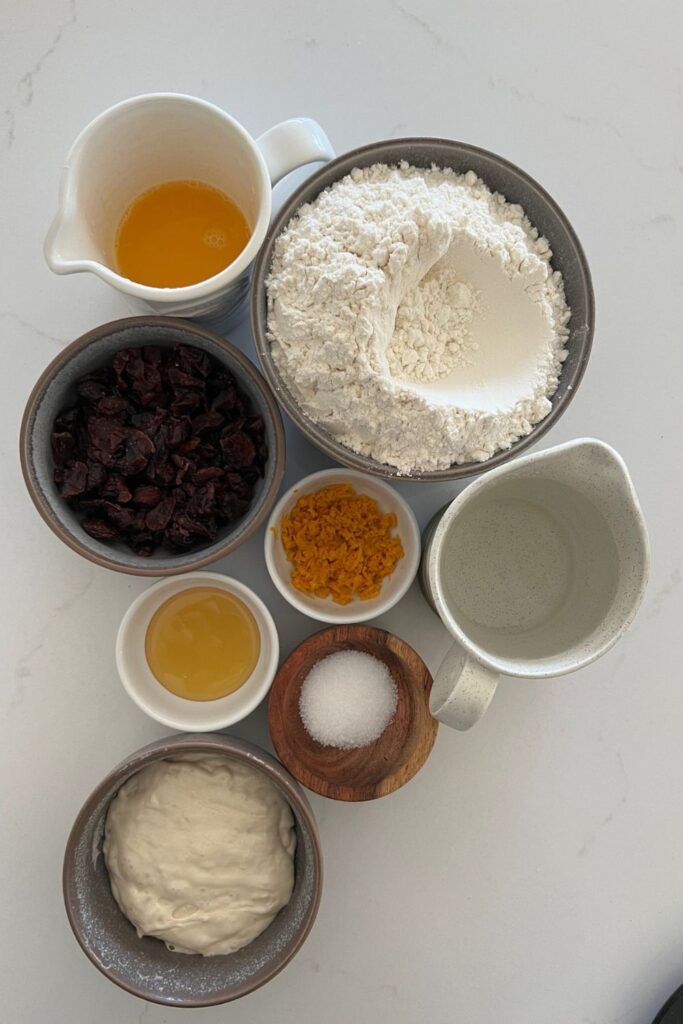
Soak The Cranberries
This step is optional, but it really gives the bread so much more flavor! Add the juice of an orange to a small bowl and add the dried cranberries. Allow them to soak until it's time to add them to the bread dough.If you don't want to soak the cranberries, you can add them dried, it doesn't make too much difference.
Autolyse - Premixing The Dough
First weigh out your sourdough starter and water into a large ceramic or glass bowl. Mix the water and starter together briefly.
Now add the honey and orange zest and stir to combine with the water and the starter.
Then add your flour and salt and mix whole lot together to form a shaggy dough.
Cover your bowl with cling film or a damp tea towel and let it sit for approximately 1 hour at room temperature.
Forming Up The Dough
After the dough has been through autolyse you need to bring it together into a ball. Work your way around the bowl, grabbing the dough from the outside, stretching it up and over itself, into the centre, until a smooth ball is formed.
You shouldn't need more than about 20-25 stretches to form the ball. You'll notice that the dough is fully hydrated after soaking all the water up. It will be fairly sticky but as you bring it into a ball, it will become smoother and shinier.
Once the dough has formed into a smooth ball, pop the cling film back on and let it rest for 30 minutes.
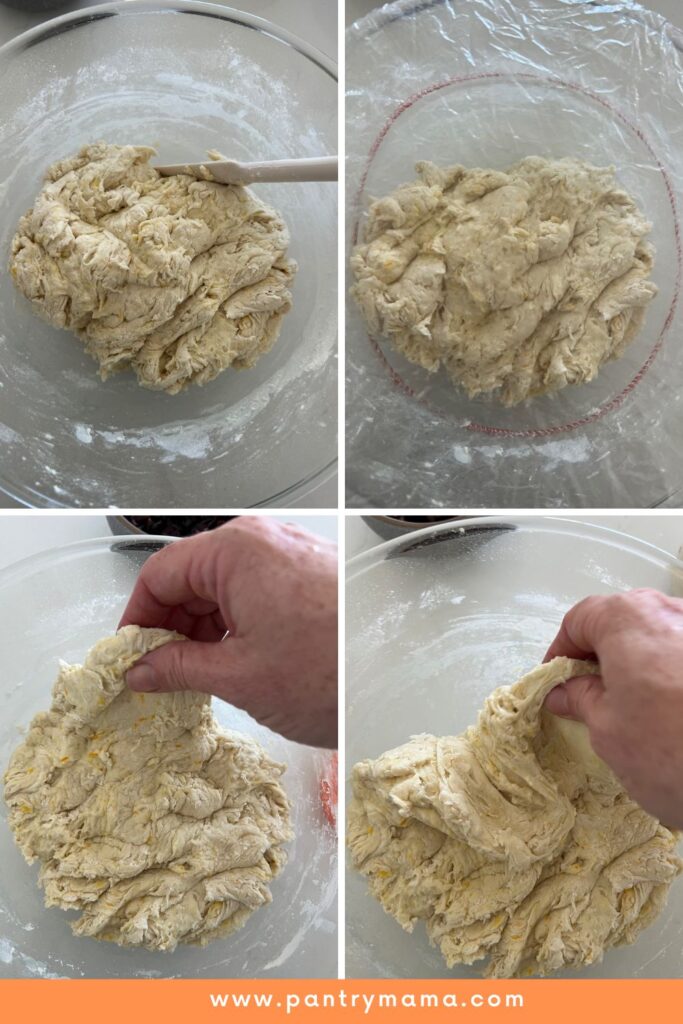
Stretch & Fold + Adding the Cranberries
Over the next few hours you need to create some structure for your dough by "stretching and folding", as well as incorporating the cranberries.
**if you soaked the cranberries in orange juice, drain off as much liquid as you can before you add them to the dough. The liquid can be discarded**
For each set, stretch the dough up and over itself 4 times. Leave around 15 minutes in between each set. Again you do not have to be exact with time, but you need to do at least 4 sets over 2 hours.
Add the cranberries around the 2nd or 3rd set of stretch and folds. Just add a handful of cranberries to the dough for each stretch and fold.
They will become incorporated over the next few hours. Alternatively, you could laminate the dough.
Aim to do around 4-6 sets of stretches and folds.
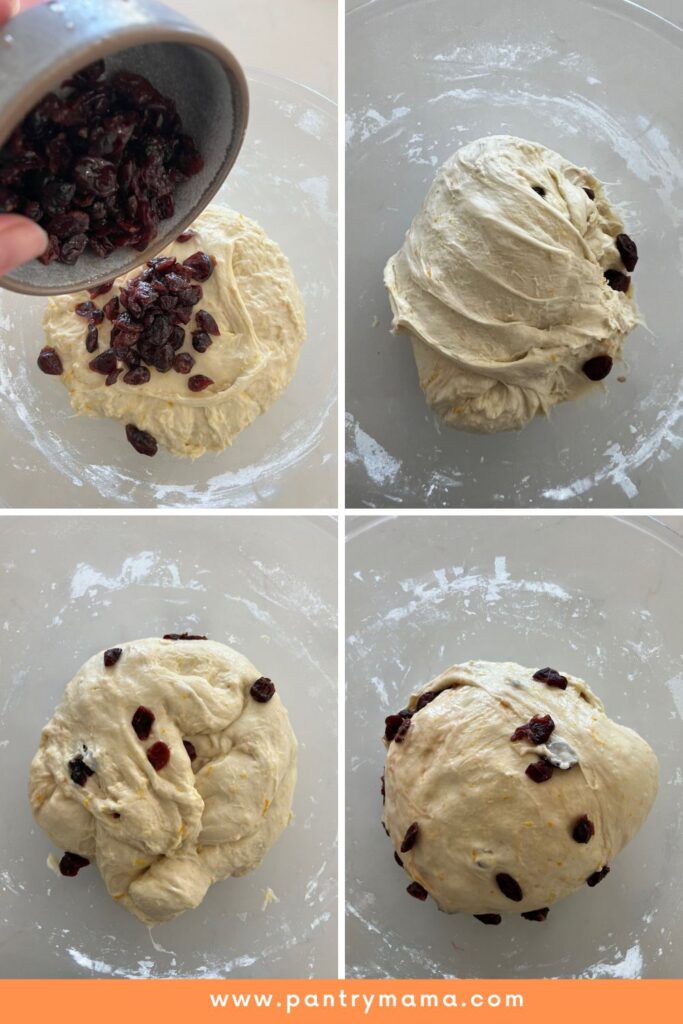
Bulk Ferment
Once you've finished your stretch and folds, place the cling film or damp tea towel back over your dough and let it rest and ferment.
You can find a full guide to bulk fermentation here.
Shaping The Dough
Once your dough has finished its first ferment, it's time to shape it into either a boule or a batard. You can see my easy shaping instructions for a batard here.
Placing Into A Banneton
Once the dough is shaped into a tight ball, place it into your banneton smooth side down, so your seam is on the top - this way the top of your dough will get the pretty lines from the banneton.
If you're using a cloth or tea towel in a bowl it's ok to put your dough with the smooth side up. Just make sure the dough is tight.
Lift your dough around the edges to pop a little more rice flour if you feel it needs it. Just try to handle the dough as little as possible and be really gentle as you really want to preserve all the gases and air bubbles that have formed during your bulk ferment.
If you don't have rice flour, corn meal or semolina works really well with this dough.
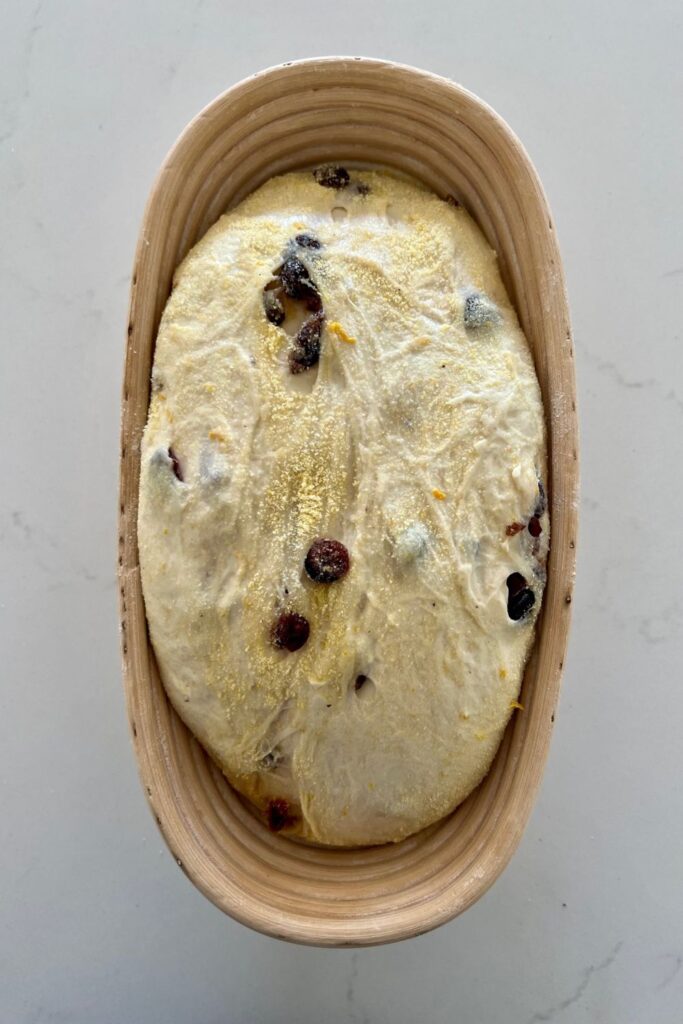
Cold Ferment
Now the dough is in its "shaping container" cover it loosely with a plastic bag or damp tea towel and place into the fridge.
Try to leave it in the fridge for a minimum 5 hours, but this dough can remain in cold proof for up to 24 hours.
Preparing To Bake
Once you're ready to bake your sourdough, you'll need to preheat your oven to 230C/450F.
Place your Dutch Oven into the oven when you turn it on so it gets hot. Try to preheat for around 1 hour to ensure your oven is super hot - but you know your oven so just adjust this time if you need to. Leave your dough in the fridge until the very last minute - placing a cold dough into a hot oven will give you a great "spring".
Bake Time!
Now it's time to bake!
When your oven is at temperature, take your sourdough out of the fridge. Gently place it onto a piece of parchment paper.
Make sure that you make the parchment paper big enough to use the edges as a handle to lower to dough into your Dutch Oven.
Gently score your bread with a lame, clean razor blade or knife. At minimum a large cross is sufficient, but you can get as artistic as you like. Try to score it fairly deep to ensure the dough opens up.
Carefully take your dutch oven out of the oven. Place the sourdough into the pot using the parchment paper as a handle. Put the lid on and place into the hot oven.
BAKE TIME:
30 Minutes with the lid on at 230C/450F plus
10-15 Minutes with the lid off at 210C/410F
Finishing The Bake
When you remove your dough from the oven, carefully remove it from the dutch oven as soon as possible and place on a wire rack to cool.
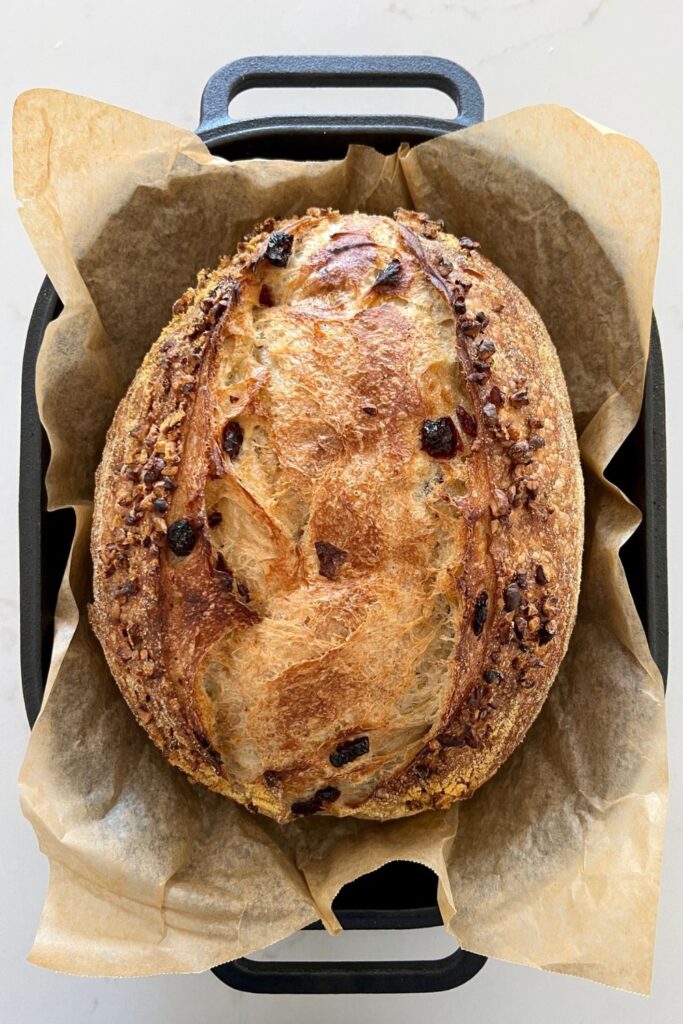
Baking Timeline
| TIME | PROCESS |
|---|---|
| 9 am | Premix and autolyse for around an hour, forming up the dough and leaving to rest for another 30 minutes before stretch and folds. |
| 11 am | 1st stretch and fold |
| 11.30 am | 2nd stretch and fold - add half the drained cranberries. |
| 12 pm | 3rd stretch and fold - add other half of the drained cranberries. |
| 12.30 pm | 4th stretch and fold |
| 1 pm | Bulk fermentation at room temperature remembering that the honey will speed up fermentation. |
| 6 pm | Shape dough into a batard, place into banneton and then into fridge for cold fermentation. |
| 9 am | Wake and bake! The next morning, you can get up, make a coffee and bake your sourdough cranberry orange loaf! It will be cool in time for a late Thanksgiving lunch. |
What Else Can I Add To Orange Cranberry Sourdough Bread?
While this elegant flavor combination is perfect as it is, here are some other ideas for ways you can add even more flavor to your sourdough bread:
- You can easily add walnuts or pistachios to this sourdough cranberry orange loaf. You can add the nuts to the dough when you stretch and fold, or alternatively you can chop the nuts and add them to the base of the banneton before placing your dough on top. The nuts will stick to the dough during the cold ferment.
- Replace the honey with maple syrup for a vegan alternative.
- Replace the orange zest with lemon zest for a citrus alternative.
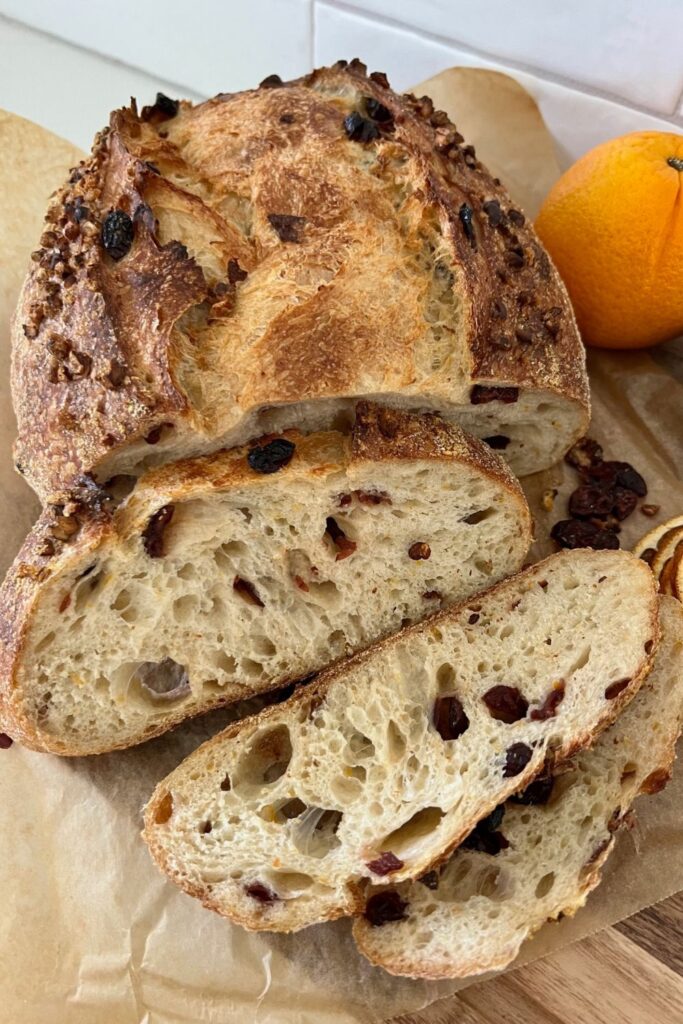
How to Store + Freeze
Like most sourdough bread, this sourdough orange and cranberry loaf is best eaten fresh or within 24 hours of baking. It can be stored at room temperature for a few days, however, after 24 hours, it will lose it's crisp crust and soft crumb.
The loaf can be frozen as a whole loaf or as individual slices. Never frozen sourdough bread before? My guide to freezing sourdough bread will walk you through the process.
Frequently Asked Questions
Yes you can use orange juice instead of water in sourdough bread. However, I find that you will get a better crumb structure and stronger orange flavor if you leave the water and use orange zest instead.
I have used dried cranberries in this recipe. I have soaked the cranberries in fresh orange juice, however I've also made it without soaking with success too.
I like the flavor and texture of the dried cranberries. They hold their shape and don't bleed into the dough.
You can use fresh or frozen cranberries, however they can cause some issues with bleeding into the dough and difficulties with shaping. If you have lots of fresh or frozen cranberries to use up, try making this cranberry orange jam or sourdough cranberry cake.
I don't recommend using all purpose flour for this recipe. Bread flour is a better choice because it is higher protein. You will need the higher protein flour, particularly if you are soaking the dried cranberries in orange juice. If you do want to use all purpose flour, I recommend adding some vital wheat gluten to the dough.
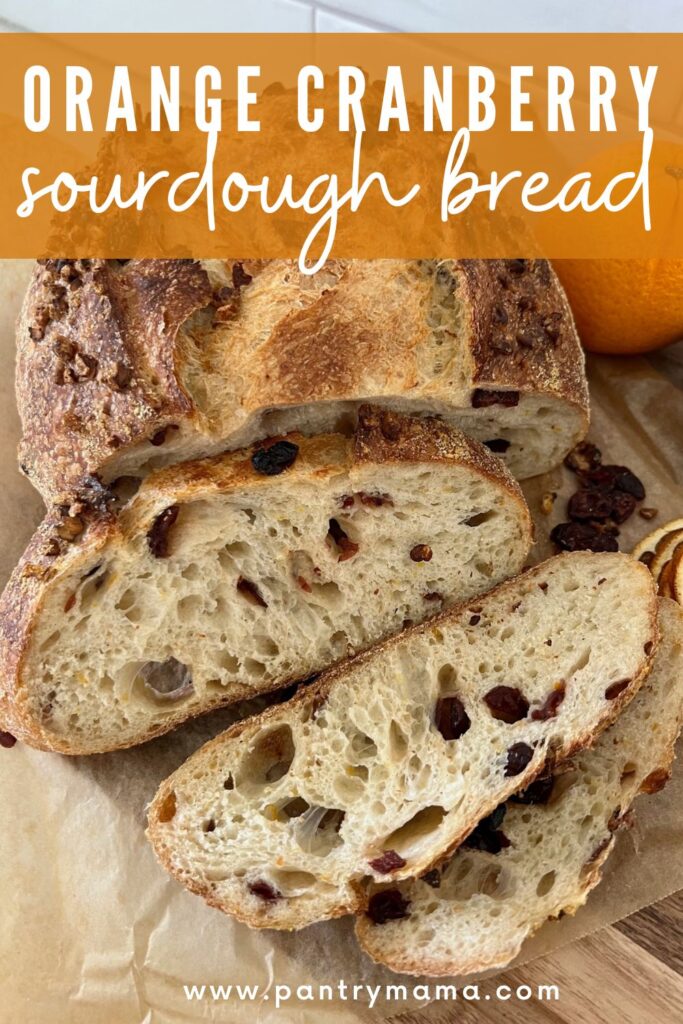
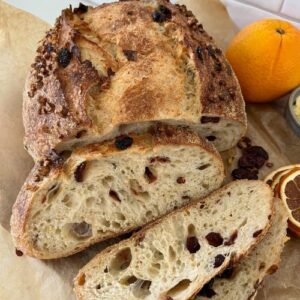
Orange Cranberry Sourdough Bread
Equipment
- Mixing Bowl
- Digital Scales
- Banneton
- Dutch Oven
Ingredients
- 50 g Sourdough Starter (Fed and Bubbly)
- 350 g Water
- 20 g Honey
- 500 g Bread Flour
- 10 g Salt
- 100 g Dried Cranberries
- Zest of whole orange
- Juice whole orange (optional)
Instructions
- Soak The CranberriesThis step is optional, but it really gives the bread so much more flavor! Add the juice of an orange to a small bowl and add the dried cranberries. Allow them to soak until it's time to add them to the bread dough.If you don't want to soak the cranberries, you can add them dried.
- Autolyse - Premixing The DoughWeigh out your sourdough starter and water into a large ceramic or glass bowl. Mix the water and starter together briefly.
- Now add the honey and orange zest and stir to combine with the water and the starter.
- Then add your flour and salt and mix whole lot together to form a shaggy dough. I find a dough scraper the easiest way to mix it as you can keep the sides of bowl clean.
- Cover your bowl with cling film or a damp tea towel and let it sit for around 1 hour.
- Forming Up The DoughAfter the dough has been through autolyse you need to bring it together into a ball. Work your way around the bowl, grabbing the dough from the outside, stretching it up and over itself, into the centre, until a smooth ball is formed. You shouldn't need more than about 20-25 stretches to form the ball.You'll notice that the dough is fully hydrated after soaking all the water up. It will be fairly sticky but as you bring it into a ball, it will become smoother and shinier.
- Once the dough has formed into a smooth ball, pop the cling film back on and let it rest for 30 minutes.
- Stretch & Fold + Adding the CranberriesOver the next few hours you need to create some structure for your dough by "stretching and folding", as well as incorporating the cranberries.**if you soaked the cranberries in orange juice, drain off as much liquid as you can before you add them to the dough. The liquid can be discarded**For each set, stretch the dough up and over itself 4 times. Leave around 15 minutes in between each set. Again you do not have to be exact with time, but you need to do at least 4 sets over 2 hours.Add the cranberries around the 2nd or 3rd set of stretch and folds. Just add a handful of cranberries to the dough for each stretch and fold. They will become incorporated over the next few hours (see notes for alternative method).Aim to do around 4-6 sets of stretches and folds.
- Bulk FermentOnce you've finished your stretch and folds, place the cling film or damp tea towel back over your dough and let it rest and ferment. See notes below for more info on this step.
- Shaping The DoughOnce your dough has finished it's first ferment, it's time to shape it into either a boule or a batard. You'll find full shaping instructions for a batard here and a boule here.
- Placing Into A BannetonOnce the dough is shaped into a tight ball, place it into your banneton smooth side down, so your seam is on the top - this way the top of your dough will get the pretty lines from the banneton. If you're using a cloth or tea towel in a bowl it's ok to put your dough with the smooth side up. Just make sure the dough is tight.Lift your dough around the edges to pop a little more rice flour if you feel it needs it. Just try to handle the dough as little as possible and be really gentle as you really want to preserve all the gases and air bubbles that have formed during your bulk ferment. If you don't have rice flour, corn meal works really well with this dough.
- Cold FermentNow the dough is in its "shaping container" cover it loosely with a plastic bag or damp tea towel and place into the fridge. I use a large plastic bag to cover it - I just reuse it each time. Try to leave it in the fridge for a minimum 5 hours.
- Preparing To BakeOnce you're ready to bake your sourdough, you'll need to preheat your oven to 230C/450F. Place your Dutch Oven into the oven when you turn it on so it gets hot. Try to preheat for around 1 hour to ensure your oven is super hot - but you know your oven so just adjust this time if you need to.Leave your dough in the fridge until the very last minute - placing a cold dough into a hot oven will give you a great "spring".
- Bake Time!Now it's time to bake!When your oven is at temperature, take your sourdough out of the fridge. Gently place it onto a piece of baking paper. Make sure that you make the baking paper big enough to use the edges as a handle to lower to dough into your Dutch Oven.Gently score your bread with a lame, clean razor blade or knife. At minimum a large cross is sufficient, but you can get as artistic as you like. Try to score it fairly deep to ensure the dough opens up.Carefully take your dutch oven out of the oven. Place the sourdough into the pot using the baking paper as a handle. Put the lid on and place into the hot oven. If you want to you can spritz your dough with extra water before you put the lid on.BAKE TIME:30 Minutes with the lid on at 230C/450F plus10-15 Minutes with the lid off at 210C/410F
- Finishing The BakeWhen you remove your dough from the oven, carefully remove it from the dutch oven as soon as possible and place on a wire rack to cool.
Notes
- Soaking The Cranberries: You do not have to soak the cranberries in orange juice if you don't want to. Soaking the cranberries gives them a juicier texture and adds more orange flavor to the dough, but it's not essential.
- Notes on Flour: This recipe is written using strong Bread Flour. Bread flour has a higher protein content than All Purpose flour. If you choose to use All Purpose flour you may have a different result because of this.
- Notes on Sourdough Starter: This recipe is based on you having an active starter that you have fed a few hours before starting your bake. For information on whether your starter is ready, go here.
- Notes on Incorporating Cranberries: You can incorporate the cranberries using a series of stretch and folds (I recommend leaving the dough in the bowl as it can get messy) or you can laminate them in. You will find instructions for laminating ingredients here.
- Notes on Bulk Fermentation: If your home is warm then your dough will ferment a lot faster and could be done in as little as a few hours. If it's colder, it will take longer, possibly overnight.
I would recommend that you try to do your first few bulk ferments during daylight hours so that you can watch your dough closely.
Once you're more familiar with the process - and the temperature of your home - you will be able to do overnight ferments. You will know your dough is ready to move to the next stage when it has *just* doubled in size. It will be fairly wobbly and full of bubbles. You should be able to see large air bubbles under the surface of the dough.
You don't want to let it go any further than doubled as it will be over fermented.
If you want to do an overnight ferment, but your home is warm, consider using a little less starter (ie 25g).
Less starter means your dough will take longer to ferment and you will reduce the risk of over fermenting your dough. You'll find more information on these topics here:
When is my bulk ferment finished? What is the difference between cold ferment and bulk ferment? Why does the amount of starter matter?
- Walnut Topping: You can see in some of the photos, I've added a walnut topping to this dough. I just crushed some walnuts and placed them in the bottom of the banneton before placing my dough on top. They stick to the dough during the cold fermentation process.
- Notes on Baking: If you're worried about the base of your bread burning, place a baking sheet on shelf underneath your Dutch Oven - it works! If you're worried about your bread not being cooked all the way through, turn the oven off and place your dough straight onto the oven rack. Leave the door ajar and let your bread rest there for a few hours. Make sure you don't close the door or your sourdough will sweat and you'll get a wrinkly, soggy crust. Remember not to cut into your loaf too soon - you'll need to let it cool for at least a few hours (4-6 is best).
Nutrition


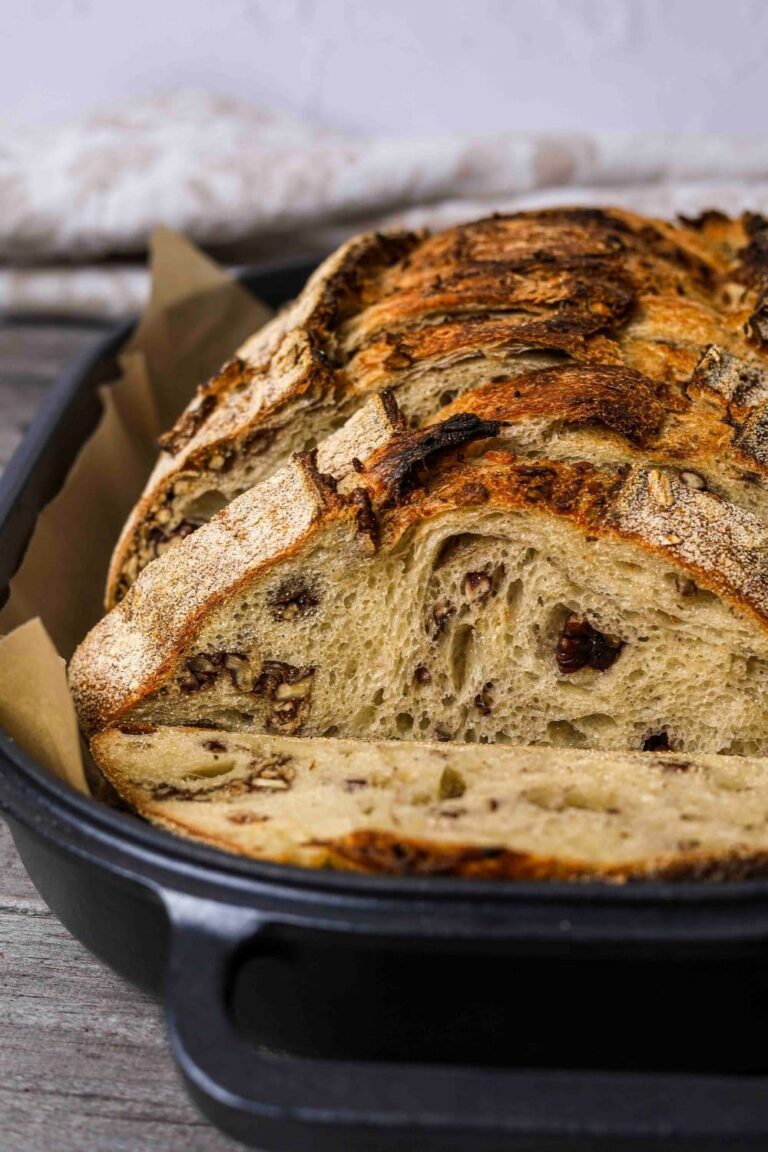
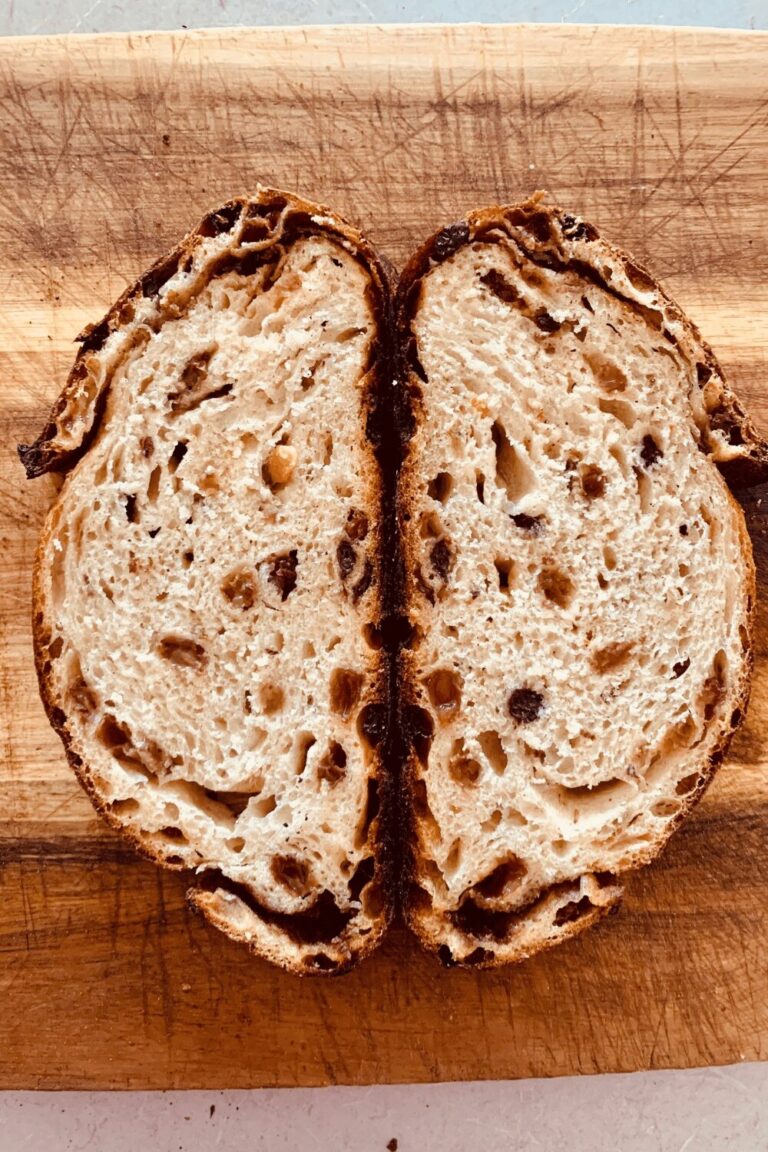

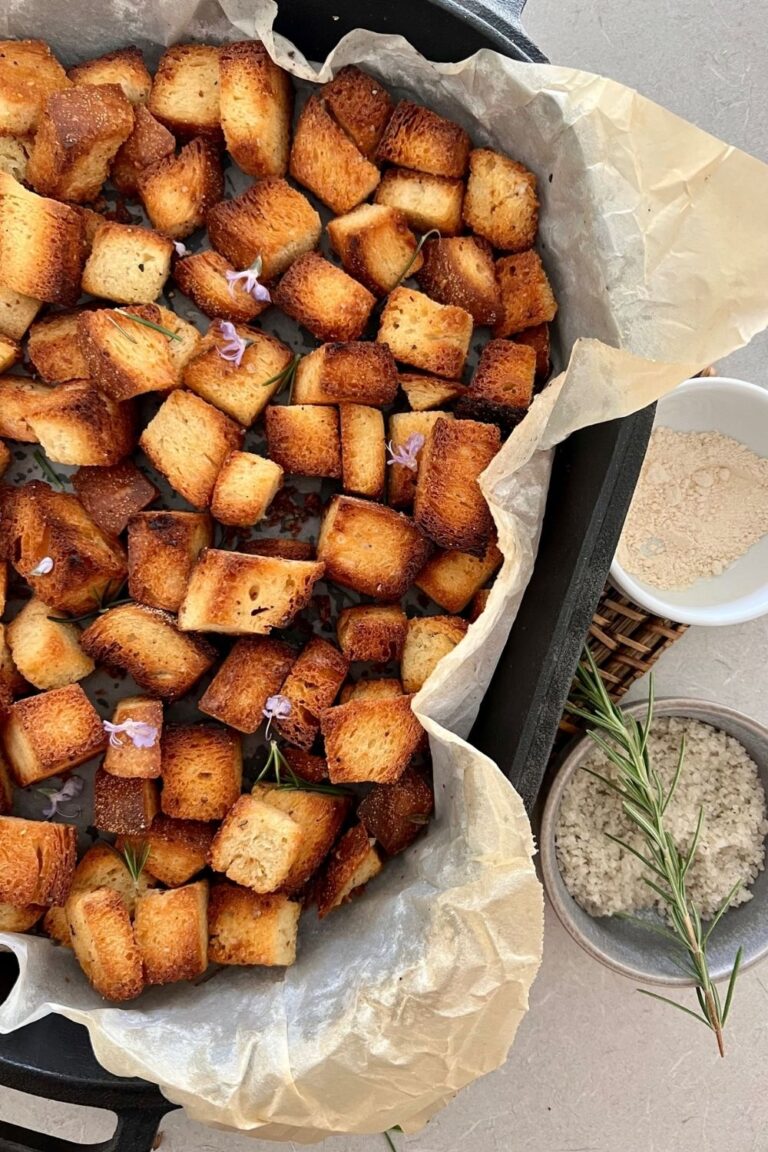

I just made this per the recipe and it did not fully ferment. Still very sticky after 4 hours. I put it in the refrig over night and it was still sticky when I baked it anyway. It had the holes and a good top crumb. The middle and bottom crumb was a little moist. Was delishous anyway. I had made a rosemary sourdough at the same time that came out perfect. Maybe because of the added ingredients I should have waited longer.
This is my all time favorite Pantry Mama recipe. And by “my” I mean “Mine ALL MINE!” (Think Daffy Duck, for those of us who were lucky enough to see the golden days of Warner Brothers cartoons). Seriously. I hoard it. I hide it. I need it. I use unsweetened dried cranberries so a little sour kick still comes through after their luxurious orange bath. Pure heaven!
Absolutely one of the best sourdough recipes ever!! Fabulous oven spring and crumb, and totally delicious. Everyone who tries it loves it! The first time I made it, I used chopped walnuts for the top of the loaf, as suggested. However, they would keep falling off as I cut the bread and make a mess. When I want nuts in the bread now, I just add them to the dough during one of the stretch and folds. Otherwise, I make the recipe exactly as written. It is a keeper and now a favorite. Thanks for sharing this fantastic recipe!
Oh, that's good! I divided it into two small boules so I could freeze one for later, but I am not sure that is going to happen now! Will be great with cream cheese!
Hi Vivian
At what stage did you divide your dough and how long did you bake for? I’m thinking of doing the same thing. It’s so hard not to polish off a full loaf!
Made this twice and it’s DELICIOUS! I took it with me to share with my Meals on Wheels volunteers and they loved it, church secretary said it’s even better than your sourdough bread that I made! Tuesday I made your sandwich bread and it was so soft and delicious also! I can’t wait to bake tomorrow! Thank you for your amazing recipes!
I would love if you added videos of you adding inclusions to your dough using stretch and fold and lamination! As well as seeing how you score the dough. It would be so helpful for my who learns visually.
Pretty new to sourdough bread but this by far has to be the best recipe I have tried so far. I soaked my cranberries, I also soaked my orange rind since all I had was dried. The aroma is so wonderful when it’s baking, but the flavor is just the best. Thank you
Oh my word. This bread is delicious! My family says this is their absolute favorite sourdough I have made. It’s a beautiful loaf of bread, absolute perfection. I laminated the craisins in and it worked perfectly as well!
How long can this stay in fridge before you have to bake it?
Absolutely love this recipe! Definitely soak the cranberries in orange juice, it makes a delightful combination. Lovely gift for the holidays!
Oh goodness this was a lovely loaf of bread. I opted not to soak my cranberries because I wanted the orange to be less forward it was a good call for me. The orange was there, but not the main player. I was looking for a good toast bread that could also make a killer turkey sandwich. Nailed it.
My dough turned out to be really wet and sticky, and there was no rise in the oven. I’ll try again with a bit less water.
You said I could leave it in the fridge for a minimum of 5 hours. I was wonder how long I could leave it in there. I normally leave my regular sourdough shaped in the fridge for 24 hours. I also wondered if I use warm water to keep the dough at 78° could I bulk ferment in the fridge for 24 hours?
What size round Banneton should I use for this bread?
can I use fresh cranberries?
You can, but they can cause some issues with bleeding into the dough and difficulties with shaping.
Don't throw out the orange juice after the cranberries soak in it-save it as a cocktail mixer!
Yum! Great tip!
Dough seems really nice but I have decided to bake this in a loaf pan instead. Just make sure it is a smaller loaf pan around 8-81/2”.
I use this recipe all the time! The most reliable and consistent recipe. Even when I thought I had enough flour to make two loaves I needed up having to sub 175 grams of bread flour with whole wheat flour. It still turned out great. Wonderful job! Keep sharing your perfect recipes!
I hardly ever leave reviews, but this recipe is stunningly great. Breakfast toast, a snack with melted gouda, turkey sandwich, tuna sandwich, chicken salad sandwich, or plain-all delicious. My family loves it and it's usually gone within 24 hours of coming out of the oven. Thank you for this crowd pleaser!
Absolutely wonderful bread! Great as toast or wonderful flavor for sandwiches too...this is a hit
This tasted fabulous and it was easy! I just started baking sourdough a couple weeks ago and this is now one of my favorites..
I see the instructions to shape a batard but not the boule. Can you provide a link to shaping a boule? Thank you and I look forward to trying your recipe.
First attempt at making this and I just woke up to realize I forgot to put the loaf in the fridge overnight - tired mom brain. Is it worth baking still or will it be very very over fermented?
I'm sure everyone agree's cranberry and orange go hand in hand. With that said the bread is just wonderful! I'm not one to follow recipes, so I took a vanilla bean, split it, took the OJ from the oranges that donated their zest and put it in the microwave for 60 seconds. I then soaked the cranberries in this enhanced juice. Along with that change, I also tried fresh cardamom, this is equally a nice variant to the original recipe. As for the vanilla addition, I believe it's superior to the original recipe. The vanilla is subtle, but it's definitely there.
Would I be able to increase the starter amount to 100g instead of 50g?
Absolutely you can! You might find this post helpful - Does The Amount of Sourdough Starter Matter? And What Happens When You Change It?
All of the recipes seem to have metric measurements instead of imperial measurements. Can a converter be added so anyone can print the recipes in the measurement system they need? Would anyone besides me find this helpful?
Using a scale is the best way to bake, it's so much more accurate then cups and spoons and ensures you have consistent measurements first time, every time! You can read more about weighing sourdough ingredients is best here.
I use fresh cranberries when I make this. I crush them in my mini food processor and add them in the 3rd S & F so they’re scattered like confetti throughout the bread. Then I add a handful of whole cranberries on the final S & F just for fun and appearance. Love this recipe!
This is sooo good!! I had plenty of starter so I did 100g but reduced the water and flour by 25g each. I agree to definitely soak the cranberries in orange juice first. I’m visiting family who happened to only have brown sugar so I used that instead of honey. I wish I could upload a picture of how beautiful this loaf is! Thank you!!
Thank you so much, Molly! So glad you loved it!
I plan to give thus a try for the holidays. Would I have to adjust any of the hydration if I use the flower mix from your country loaf …I.e 20 % whole wheat ?
No I wouldn't change it, just add the inclusions as it is 🙂
I love your recipes. It’s where I go first when I’m looking for something to bake. I want to make the orange cranberry loaf for Christmas breakfast. I tried it yesterday and I soaked the cranberries in the orange juice. Then drained them and folded them in. The dough after bulk fermentation was so wet. I couldn’t shape it and had to pour it into the bannetton. Could I have soaked them too long? Or not drain them well enough? It was just an incredibly wet loaf. I'm going to try again and wondered if you had any suggestions. Thank you and happy holidays!
Happy Holidays! I would say that they weren't drained well enough, or the flour you're using wasn't quite up to absorbing all the liquid. I would try patting them with paper towel next time and see how that goes. As a last resort, add a little more flour to absorb the extra liquid 🙂 x
This bread was delicious!
I did soak my cranberries and it really did make all the difference. Thank you for that tip. I will definitely make this again. It was wonderful as the bread for a turkey sandwich. In fact, it was out of this world. Many thanks and I look forward to making some of your other recipes.